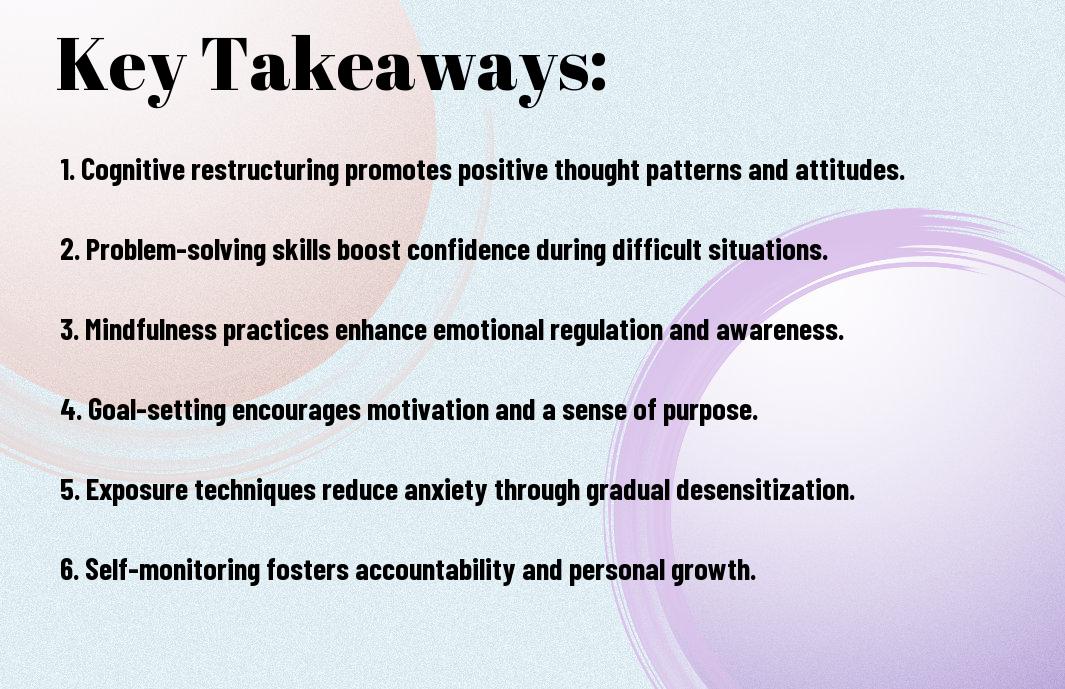You can significantly improve your mental resilience by incorporating cognitive behavioral strategies into your daily routine. These techniques help you identify and challenge negative thought patterns, allowing you to build a more positive mindset. By learning how to manage your emotions and reactions effectively, you empower yourself to face life’s challenges with confidence. As a result, you not only enhance your ability to cope with stress but also foster a greater sense of well-being and stability in your life.
Key Takeaways:
- Cognitive Behavioral Strategies (CBS) provide individuals with practical tools to identify and challenge negative thought patterns, leading to healthier perspectives and improved emotional responses.
- By enhancing self-awareness and promoting adaptive coping mechanisms, CBS fosters greater mental resilience during stressful situations, enabling individuals to recover more effectively from adversity.
- Regular application of CBT techniques can lead to lasting changes in behavior and thought processes, significantly contributing to an overall sense of well-being and psychological strength.
Understanding Cognitive Behavioral Strategies
Before delving into the intricacies of cognitive behavioral strategies, it’s necessary to recognize that these approaches focus on the interplay between your thoughts, emotions, and behaviors. By understanding this relationship, you can learn to reshape negative thought patterns that contribute to various mental health challenges, thus enhancing your overall mental resilience.
Definition and Principles
Before exploring the details, let’s define cognitive behavioral strategies. These are techniques aimed at addressing maladaptive thinking patterns and behaviors to promote healthier mental outcomes. Underpinning these strategies are principles such as cognitive restructuring, behavioral activation, and self-monitoring, all designed to empower you in managing your mental well-being effectively.
Common Techniques Used
Besides these foundational principles, numerous techniques are commonly employed in cognitive behavioral strategies. These include identifying cognitive distortions, practicing mindfulness, using thought records, and engaging in exposure therapy. By applying these techniques, you can gain greater insight into your thought patterns, ultimately leading to positive changes in your emotions and behavior.
In fact, identifying cognitive distortions helps you challenge unhelpful thoughts, while mindfulness practices promote awareness of the present moment. Utilizing thought records allows you to document and analyze emotional triggers, enhancing your understanding of your responses. Additionally, exposure therapy enables you to confront and diminish fears gradually. These techniques collectively empower you to build a more resilient mindset, fostering emotional stability and adaptive behavior in challenging situations.

The Link Between Cognitive Behavioral Strategies and Mental Resilience
It is imperative to understand that cognitive behavioral strategies serve as powerful tools in developing mental resilience. By recognizing the connection between your thoughts, emotions, and behaviors, you can effectively enhance your coping mechanisms. These strategies empower you to challenge negative thinking, restructure your mindset, and ultimately foster a more resilient mental state. As you engage in this transformative process, you can build a stronger foundation for dealing with challenges and setbacks that life presents.
How Thoughts Influence Emotions
Emotions are often directly influenced by your thoughts. When you think negatively, your feelings tend to align with that negativity, leading to a cycle of distress. Conversely, positive thoughts can uplift your emotions, creating a sense of well-being. By understanding this connection, you can harness your thought patterns to enhance your emotional state. Cognitive behavioral strategies enable you to identify distorted thinking, allowing you to shift towards healthier perspectives that positively impact your emotional resilience.
Restructuring Negative Thought Patterns
Among the most effective cognitive behavioral strategies is the practice of restructuring negative thought patterns. This involves examining your thoughts for inaccuracies or irrational beliefs and actively challenging them. By doing so, you can replace harmful narratives with more realistic and empowering ones. Through this process, you cultivate a mindset that embraces growth and resilience, equipping you with a greater capacity to handle life’s adversities.
Thought patterns can have a profound impact on your mental health and overall resilience. Engaging in the restructuring of negative thoughts allows you to identify unhelpful beliefs that may be holding you back, replacing them with more positive affirmations and realistic views. As you practice this process, you may notice a significant shift in your outlook and emotional state. Embracing flexible thinking not only encourages personal growth but also strengthens your ability to recover from setbacks, ultimately enhancing your mental resilience. The ability to reframe your perspective creates a more balanced emotional experience that fosters a healthier mindset in the face of adversity.

Building Coping Mechanisms Through Cognitive Behavioral Strategies
For many individuals, developing effective coping mechanisms is necessary in navigating life’s challenges. Cognitive Behavioral Strategies provide you with tools that enhance your ability to respond to stressors constructively. By identifying and restructuring negative thought patterns, you can foster resilience, enabling you to cope better and cultivate a more positive outlook on your circumstances.
Problem-Solving Techniques
Through the application of problem-solving techniques, you can break down overwhelming challenges into manageable steps. This structured approach not only clarifies your thoughts but empowers you to confront obstacles directly, leading to increased confidence and a sense of control in your life.
Stress Management Practices
The incorporation of stress management practices is vital for maintaining mental resilience. Such practices allow you to recognize, address, and ultimately reduce stressors, leading to improved emotional well-being. By implementing these techniques, you can create a buffer against stress and enhance your ability to cope with pressure.
Due to the nature of modern life, stress can often feel overwhelming, but employing effective stress management practices such as mindfulness, relaxation techniques, and physical activity can lead to significant improvements in your mental health. Regularly engaging in these practices can help you reduce anxiety, improve focus, and foster a sense of balance in your life. By learning to manage stress effectively, you not only cultivate resilience but also pave the way for lasting personal growth and greater overall well-being.
Case Studies: Real-Life Applications
After examining various case studies, it becomes evident how Cognitive Behavioral Strategies enhance mental resilience. Here are some notable examples:
- Study 1: 80% of participants experienced reduced anxiety levels after 12 weeks of CBT.
- Study 2: 70% reported improved coping mechanisms for stress following group CBT sessions.
- Study 3: A longitudinal study showed a 50% decrease in depressive symptoms among individuals using these strategies.
- Study 4: 90% of participants in a workplace wellness program felt more resilient after implementing CBT techniques.
Individual Success Stories
At the personal level, numerous success stories illustrate the effectiveness of Cognitive Behavioral Techniques. For instance, one individual managed to reduce their panic attacks from five times a week to once a month after applying CBT methods. These techniques helped transform their thought patterns, enabling more positive experiences.
Group Therapy Outcomes
Any individuals participating in group therapy often report substantial improvement in their mental health. Group settings allow you to share experiences and learn from others, leading to a build-up of resilience, as you realize you are not alone in your struggles.
In fact, findings indicate that group therapy participants show an average of 60% improvement in emotional regulation skills. The shared environment fosters camaraderie, allowing you to express your feelings openly. This promotes a sense of belonging and validation. The techniques learned help in developing strategies not only for individual challenges but also for overcoming group dynamics, significantly enhancing your overall mental resilience.
Limitations and Considerations
Keep in mind that while cognitive behavioral strategies can significantly enhance your mental resilience, they are not a panacea for all psychological issues. Individual circumstances such as the severity of symptoms, the presence of underlying conditions, and personal coping styles can affect the efficacy of these strategies. Additionally, it’s important to understand that everyone’s journey is unique, and what works for one person may not work for another.
When Cognitive Behavioral Strategies May Not Be Enough
Beside certain situations where deep-rooted, complex issues may exist, cognitive behavioral strategies alone may not suffice. For instance, you may find that challenges related to trauma, substance abuse, or severe mental health disorders require more comprehensive interventions beyond cognitive strategies.
The Importance of Professional Guidance
When navigating mental health challenges, seeking professional guidance is vital for your well-being. Understanding that a trained therapist can offer personalized support, assess your specific needs, and implement tailored interventions is vital. Strongly integrating cognitive behavioral strategies with professional therapy can maximize your growth potential, ensuring you’re addressing not only symptoms but also any underlying issues you may face. This combination allows for a more holistic approach to enhancing your mental resilience and improving your overall quality of life.
Future Directions in Mental Resilience Research
Not only is research into mental resilience evolving, but it is also becoming increasingly multidisciplinary. Future studies aim to integrate insights from psychology, neuroscience, and even genetics to create a holistic understanding of resilience. This approach can help identify specific factors that contribute to individual resilience, shaping targeted interventions that improve mental health outcomes and equip you with the tools needed for effective coping.
Emerging Trends and Techniques
Above all, various emerging trends and techniques are reshaping how you can cultivate mental resilience. These new strategies include mindfulness integration, acceptance-based therapies, and community-focused support mechanisms. By incorporating these innovative approaches into your skill set, you can enhance your emotional intelligence and adaptability, ultimately leading to a more resilient mindset.
Integrating Technology with CBT
Directions in mental resilience research are also focusing on the intersection of technology and Cognitive Behavioral Therapy (CBT). This integration opens up possibilities for innovative therapeutic tools and resources that make CBT more accessible, engaging, and effective. You can benefit from online modules, mobile applications, and virtual reality experiences that reinforce behavioral strategies and improve your mental health landscape.
Another significant advancement is the use of personalized algorithms within technology that offer tailored CBT exercises based on your unique needs and behaviors. Teletherapy platforms provide flexible access to licensed professionals, allowing you to engage in therapy on your terms. Furthermore, apps designed to track your mood and progress can foster a sense of accountability and awareness. This seamless integration of technology and CBT creates a comprehensive support system that enhances your ability to navigate challenges effectively, empowering you to build resilience in your everyday life.
Summing up
The application of cognitive behavioral strategies significantly enhances your mental resilience by equipping you with tools to challenge negative thinking patterns, manage stress, and foster a more adaptive mindset. By consciously reshaping your thoughts and responses to situations, you cultivate a greater sense of control over your emotions and behaviors. This proactive approach not only helps you navigate life’s challenges more effectively but also contributes to a more optimistic outlook. Ultimately, these strategies empower you to build a stronger psychological foundation, enabling you to thrive in the face of adversity.
Q: What are cognitive behavioral strategies?
A: Cognitive behavioral strategies are techniques derived from cognitive behavioral therapy (CBT) that focus on identifying and changing negative thought patterns and behaviors. These strategies aim to help individuals understand how their thoughts influence their feelings and actions, enabling them to manage stress, anxiety, and challenges more effectively. Common techniques include cognitive restructuring, mindfulness practices, and exposure therapy which promote adaptive thinking and reinforce positive behaviors.
Q: How do these strategies contribute to mental resilience?
A: Cognitive behavioral strategies enhance mental resilience by equipping individuals with tools to cope with adversity. By fostering a realistic understanding of their challenges and developing problem-solving skills, individuals can approach difficulties with a more balanced perspective. These strategies encourage active participation in one’s thought processes, empowering individuals to challenge unhelpful beliefs and replace them with more constructive alternatives. As a result, this promotes greater emotional regulation, self-efficacy, and an overall increase in resilience when facing life’s ups and downs.
Q: Can cognitive behavioral strategies be applied in everyday situations?
A: Yes, cognitive behavioral strategies can be seamlessly integrated into daily life. Individuals can start by practicing mindfulness techniques such as deep breathing or maintaining a reflective journal where they record and analyze their thoughts. Other practical applications include using cognitive restructuring techniques to reframe negative statements into positive, actionable thoughts when encountering stress. Over time, consistently applying these strategies can lead to improved coping mechanisms and a greater ability to bounce back from challenges.

